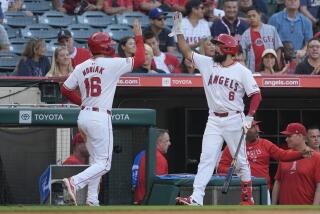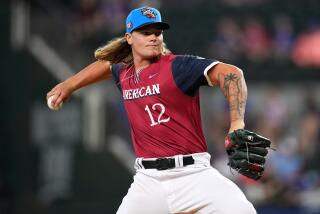Angels Working Hard to Build From Within
- Share via
The Angels’ international scouting, circa 1993: A strapping kid with a wide smile arrives for a press conference at Anaheim Stadium. The Angels proudly introduce Gus Leger, 18, as the first New Zealander to play professional baseball.
The question to Leger: Have you played any baseball?
“I haven’t,” Leger said that day. “Would it help?”
Apparently, yes. Leger, signed from New Zealand’s national youth fastpitch softball team, washed out of the Angels’ minor league system in two years, without hitting a home run.
While the Angels were surfing for miracles in New Zealand, teams such as the Dodgers, New York Yankees and Atlanta Braves were spending millions to mine talent from baseball hotbeds in Latin America and elsewhere. Bill Bavasi convinced Disney to shop for--and buy--talent around the world, in what could be his greatest legacy as the Angels’ general manager.
“You have to be in the international market if you want to be a major player in major league baseball,” Bavasi said.
The Angels drafted 45 players who appeared in the major leagues last season, more than any other club. They drafted and developed five players--Darin Erstad, Troy Percival, Dante Bichette, Damion Easley and Devon White--who made the All-Star game last year. If not for injuries to outfielders Jim Edmonds and Tim Salmon and second baseman Justin Baughman, the Angels could field a lineup of Mo Vaughn and nine home-grown players.
“The thing that’s impressive about the job they’ve done in Anaheim is that a lot of those guys are home-grown players. That’s a tribute to Bill and [scouting director] Bob Fontaine,” San Diego Padre General Manager Kevin Towers said. “That’s something we haven’t done a lot of recently.”
The Padres did, however, pay to secure the rights to Japanese pitcher Hideki Irabu. The Padres then traded him to the Yankees for pitcher Rafael Medina and outfielder Ruben Rivera, both signed by New York out of Panama. Eight months later, when the Padres needed an ace pitcher to complete their National League championship team, they traded Medina to the Florida Marlins in the package that brought Kevin Brown to San Diego.
Every team participates in the draft, which covers players from the United States, Puerto Rico and Canada. Players elsewhere are sold among bidders. With the Angels refusing to bid, they lacked any surplus for trades or any sizable margin for error in player development.
The Angels can’t develop pitchers, you say? Check out the Dodgers. From 1983 to 1990, the Dodgers spent their first draft pick on a pitcher six times. All were busts.
The Dodgers’ legendary international operations saved the franchise from disaster. The Dodgers had the luxury of covering their mistakes by signing the likes of Ismael Valdes (Mexico), Ramon Martinez and Pedro Astacio (Dominican Republic), Hideo Nomo (Japan) and Chan Ho Park (South Korea) and promoting them into the starting rotation.
“Fontaine has never had that to fall back on,” Bavasi said. “Fontaine is the best scouting director in baseball. He’s never had international resources. When you look at our players, what more do you want out of the guy? Our scouting was the draft. Most every other club in baseball was scouting the world.
“Thank God our ownership has stepped up.”
The Angels’ top prospect, pitcher Ramon Ortiz, hails from the Dominican Republic. Last winter, the Angels outbid several other clubs to sign Venezuelan pitcher Francisco Rodriguez, whose $900,000 bonus set a team record for foreign players.
Other promising international prospects include outfielder Elpidio Guzman (Dominican Republic) and infielders Nelson Castro (Dominican Republic), Trent Durrington (Australia), Bienvenido Encarnacion (Dominican Republic) and Carlos Gastellum (Mexico).
More to Read
Go beyond the scoreboard
Get the latest on L.A.'s teams in the daily Sports Report newsletter.
You may occasionally receive promotional content from the Los Angeles Times.







